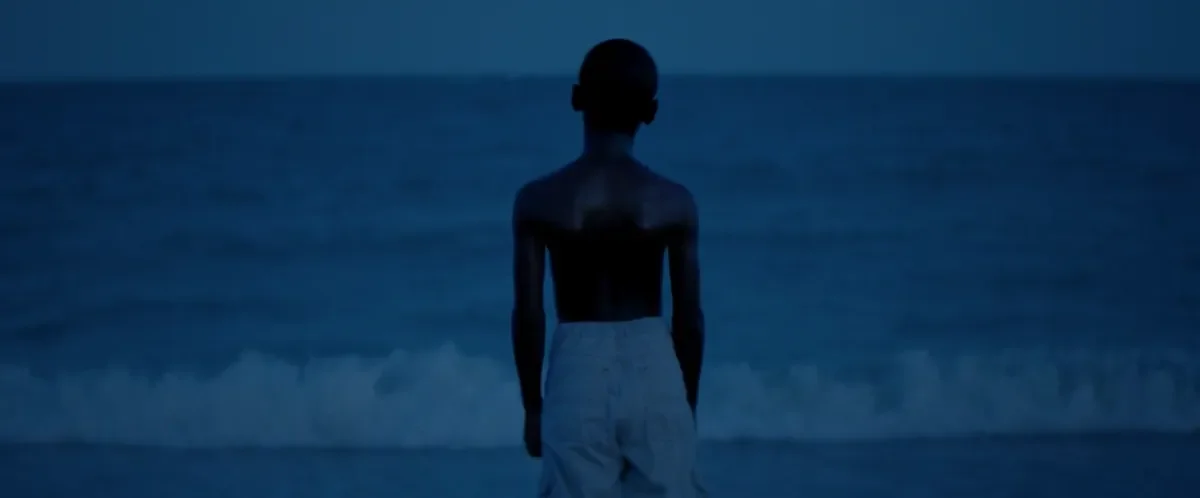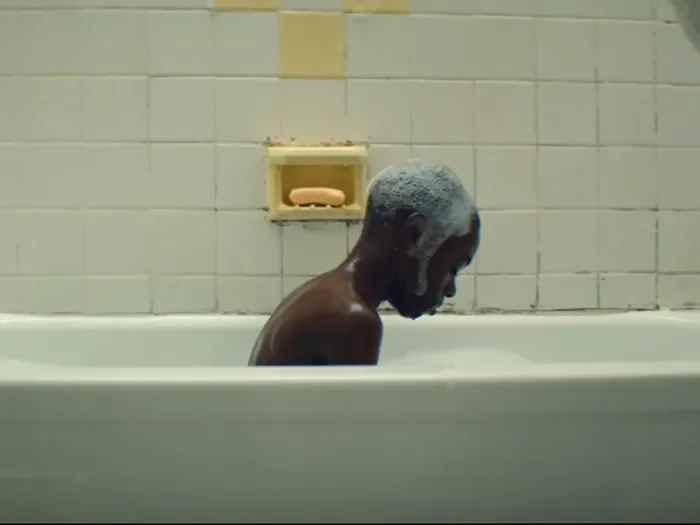a bed made of ambiguity and repression
Oscar-winning Best Picture, Moonlight (2016), is a fascinating film that I don’t think I could ever get tired of. Its structure is simple. Moonlight follows the life of Chiron throughout three phases—Little, Chiron, and Black—these three significant milestones define the man that Chiron becomes. It takes you on a journey that navigates masculinity, sexuality, drug abuse, poverty, and the relationship between mothers and sons, and it feels like a punch to the gut.
“At some point, you gotta decide for yourself who you are going to be, you can’t let nobody make that decision.”
Identity plays a pivotal role in the film. It moulds and shapes Chrion from age 10 as the world begins to assert itself into this young boy’s life. The world expands rapidly, too rapidly. At every point, he’s told what it means to be a man, to be hard, not soft. To lend himself to fighting, violence, and domination. To remove any aspects of emotion because they aren’t manly. This sentiment doesn’t only exist in the community but in the home, receiving homophobic comments from his absent mother—isolating him further and turning to his peers as arbiters of masculinity. Boys, especially black boys, can’t just be boys; they must be versions of themselves that aren’t allowed the luxury of basking in their youth.
I despise the phrase, “Boys will be boys.” It’s a neglectful phrase that invites negative connotations of what it means to be a boy or a man. It allows for stereotypes to raise a boy, different to the way girls are raised—with deep-rooted dos and don’ts—instead, it is a phrase to excuse a lack of parenting. It allows anything and everyone to raise that boy in an environment that clearly despises children and idolises gender roles. It is a form of repression, removing the individual characteristics of a person to fit the rigid gender roles that people love to squeeze others into; it’s what happened to Kevin as well.
Kevin clearly understood his role in his community from a young age. He knew when to code-switch, prattling on about his sexual conquests and talking to the other guys the way he was expected to. But in that moment, Chiron and Kevin were together on that beach in Miami, and they were themselves. Not shells or a mirage of what everyone else was trying to tell them to be, they were free. But toxic masculinity is an infection, and neither were free from it. It was the goading from the arbiters of masculinity (i.e. their “friends”) that turned their relationship sour quickly. The necessity of acceptance from the collective felt far more forceful than the need to be oneself for Kevin, turning Chiron into Black. Kevin performed “hardness” that was required at the level that Chiron couldn’t emulate to prove his masculinity to the group, beating Chiron to a pulp. Protection from the group mattered more. The fear of violence, ridicule, and shame was far greater than losing yourself.
Juan was an interesting and complex character. On one hand, he’d become a pseudo-father figure for Chiron for years. In some ways, he saw himself as a saviour for Chiron, providing him a place to stay, food to eat and lessons to learn. He is gentle, kind, and respectful, allowing Chiron the space to be vulnerable and free from the harsh judgment of the world. He is everything we expect a man to be. On the other hand, he sold drugs to this same boy’s mother. He knew he was no better than her, ‘trapping’ to get by and making money only to keep the cycle going. Merhashala Ali’s performance, making this realisation, was moving; no words were spoken, just a flurry of emotions washing over him.
I believe Juan saw himself in Chiron. He saw what the world was doing to a young boy and thought he could help, only to realise he wasn't that different from the world he tried to shield Chiron from. The scene where Juan told Chiron the truth about his mother and himself broke me.
“I cry so much, sometimes I feel like imma just turn into drops.”
It was a tough pill to swallow, watching Chiron spiral into a shell of himself, both literally and figuratively. A boy who lacked true love in all senses, from his drug-addicted mother, Paula, who resented him for not being the man she wanted him to be, and possibly projecting her trauma onto the men who have appeared in her life, isolating and manipulating them for something that wasn’t his fault. Juan is now dead, Chiron has no father figure, and Teresa is still there, but with his mother’s sentiments replaying in the back of his head, he can never fully feel the love that she has for him.
In that moment of vulnerability, love and intimacy between Kevin and Chiron on the beach, you can see his worldview change. Not only did they feel like themselves, but the yearning for love that Chiron had
longed for was right in front of him. However, it was fleeting. Seeing the example of toxic masculinity set by Kevin, Chiron took it upon himself to become hard.
And the effects?
The Chiron you see in the third Act is no longer little, or Chiron, but Black. Making himself physically imposing, angry and violent.
Disconnected.
"You’re the only man who’s ever touched me... you're the only one."
Black.
My favourite act in Moonlight. Everything about what was to come was so unassuming to Chiron. He’d become the version of himself the world needed him to be, the man that Juan tried to steer him away from. But that call he received from Kevin made that shell melt away. Travante Rhodes’ performance as black was beautiful, all three performances as Chiron were amazing, and they all understood who he was and delivered that beautifully. But Rhodes’ expressions in this final act took the cake, so much was left unsaid in a manner that brought Chiron back to his childlike self. He lets everything but the words do the heavy lifting.
As Kevin and Chiron reunite, everything slows down in a way that lets every moment, every second, settle before moving on to the next. I have a deep appreciation for this scene, the silence, the song “Hello Stranger” by Barbara Lewis playing, and the looks. It reminded me of one of my favourite movies, Portrait of a Lady on Fire (2019). Everything about both movies was subtle in the approach to intimacy. The love that Chiron had yearned for came back, and this time, he wasn’t letting it go the way he had for years prior. In that final scene of Chiron and Kevin together, the colour grading had finally changed from the sterile cool blue hue to a warm brown tone. Chiron had found himself again, and Kevin the same.
Everything about it was beautiful, and I’m so glad to have seen this movie when I did. The me in 2016 probably wouldn’t have appreciated this movie as I have now, and I fear the me in maybe 5 years would look back on this review and think I didn’t appreciate it enough. But alas, at least I know my appreciation will only grow.




